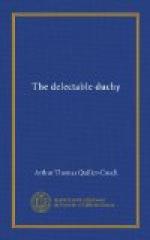The whitewashed front of the Meeting House was bathed, next evening, with soft sunset yellow when Mr. Penberthy the elder stole down the stairs between the exhortations, as his custom was, and stood bareheaded in the doorway respiring the cool air. As a deacon he temperately used the privileges of his office, and one of these was a seat next the door. The Meeting House was really no more than a room—a long upper chamber over a store; and its stairway descended into the street so sharply that it was possible, even for a short-armed man, to sit on the lowest step and shake hands with a friend in the street.
The roadway was deserted for a while. Across the atmosphere there reigned that hush which people wonder at on Sundays, forgetting that nature is always still and that nine-tenths of the week’s hubbub is made by man. Down the pale sky came a swallow, with another in chase: their wings were motionless as they swept past the doorway, but the air whizzed with the speed of their flight, and in a moment was silent again. Then from the upper room a man’s voice began to roar out upon the stillness. It roared, it broke out in thick sobs that shook the closed windows in their fastenings, it wrestled with emotion for utterance, and, overcoming it, rose into a bellow again; but, whether soaring or depressed, the strain upon it was never relaxed. Uncle Penberthy, listening to his son, felt an oppression of his own chest and drew his breath uneasily.
The tin-smith came round the corner and halted by the door.
“That son o’ yours is a boundless man,” he observed with an upward nod.
“How did he strike ye this morning?”
“I don’t remember to have been so powerfully moved in my life. Perhaps you and me being cronies for thirty year, and he your very son, may have helped to the more effectual working; but be that as it may, I couldn’t master my dinner afterwards, and that’s the trewth. Ah, he’s a man, Uncle; and there’s no denying we wanted one of that sort to awaken us to a fit sense. What a dido he do kick up, to be sure!”
The tin-smith shifted his footing uneasily as if he had something to add.
“I hope you won’t think it onneighbourly or disrespectful that I didn’ come agen this evenin’,” he begun, after a pause.
“Not at all, Jem, not at all.”
“Because, you see—”
“Yes, yes, I quite see.”
“I wouldn’ have ye think—but there, I’m powerful glad you see.” His face cleared. “Good evenin’ to ye, Uncle!”
He went on with a brisker step, while Uncle Penberthy drew a few more lingering breaths and climbed the stairs again to the close air of the meeting-room.
“I’m afraid, father, that something in my second exhortation displeased you,” said the Rev. William Penberthy as he walked home from service between his parents. He was a tall fellow with a hatchet-shaped face and eyes set rather closely together.




